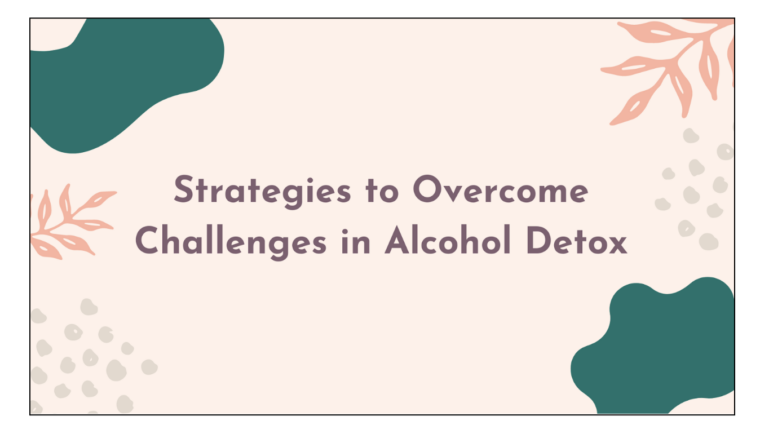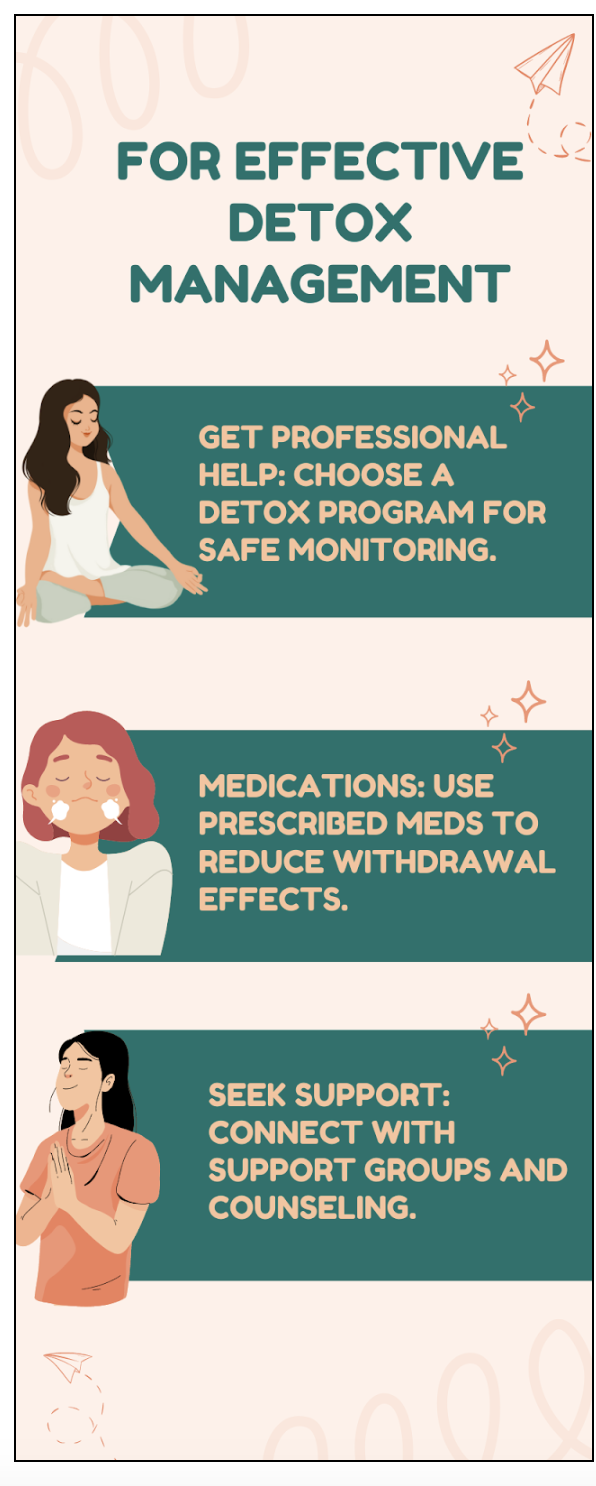Strategies to Overcome Challenges in Alcohol Detox
Are you struggling with the daunting task of alcohol detox? You’re not alone. Overcoming alcohol addiction is complex and often overwhelming, but with the right strategies and support, individuals can successfully navigate this journey and achieve lasting sobriety.

This comprehensive guide explores key steps to help you overcome the challenges of alcohol detox and set yourself on the path to a healthier, happier life.
Understanding the Alcohol Detox Process
Embarking on the alcohol detox journey can be unpredictable, as symptoms can vary greatly in severity. From mild anxiety to severe physical reactions, it’s essential to have a realistic understanding of what to expect during this critical period.
Anticipating Withdrawal Symptoms
During alcohol detox, your body and mind will undergo significant changes as it adapts to the absence of alcohol. You may experience a variety of withdrawal symptoms, including autonomic arousal to severe complications such as delirium tremens (DT), as described in a study published in the National Library of Medicine. Understanding that symptoms often peak within the first 24-72 hours can help you prepare for the challenges ahead.
The Importance of Medical Supervision
Medical professionals play a crucial role in ensuring a safe and manageable detox process. They will closely monitor your vital signs, manage your withdrawal symptoms through medication, and provide invaluable emotional support throughout your journey. Their expertise and guidance can make all the difference in your success.
Key Strategies for Successful Alcohol Detox
Approaching alcohol detox with the right mindset and strategies can significantly improve your chances of success. Here are some key steps to consider:
Seek Professional Help
One of the most important decisions you can make is to seek professional help for your alcohol detox. Detox programs provide a structured environment that enhances safety and improves success rates. As the study states, Benzodiazepines have the best evidence base in the treatment of alcohol withdrawal, significantly reducing the risk of severe withdrawal symptoms. Seeking professional help is crucial for a successful detox process.
Choosing the Right Detox Program
When considering the journey to recovery, the importance of selecting the right alcohol detox program cannot be overstressed. It’s a crucial first step towards reclaiming control over one’s life, offering a foundation for long-term sobriety and health. Detoxification from alcohol can prevent potentially life-threatening withdrawal symptoms and provide a supportive environment for starting the recovery process.
Recovery begins with recognizing the need for help. If you’re looking for a starting point, searching for alcohol detox near me could reveal a variety of programs tailored to your unique situation. Assessing your level of alcohol dependence and personal health will guide you in choosing between inpatient and outpatient care.
Overcoming Withdrawal Symptoms
Navigating withdrawal symptoms during alcohol detox can be challenging, but various strategies and therapies can help ease discomfort.
Medications and Therapies
Commonly used medications, such as Benzodiazepines, can help manage anxiety, tremors, and other physical symptoms. Additionally, therapeutic interventions, such as counseling and support groups, can provide invaluable mental and emotional support during this difficult time. Exploring the various medications and therapies available can help you find the right approach to manage your withdrawal symptoms.
Seeking Mental and Emotional Support
Connecting with others who have been through the alcohol detox process can offer comfort, practical tips, and a sense of community. Sharing your experiences and strategies can be a powerful tool in overcoming the challenges of withdrawal. Engaging with support groups and counseling can be a game-changer in your recovery journey.
Preparing for Post-Detox Challenges
Successful alcohol detox is just the first step in your journey to long-term recovery. It’s essential to have a plan in place for the challenges that may arise after the initial detox period.
Transitioning to Rehabilitation
Rehabilitation programs offer a deeper understanding of the root causes of addiction and provide the tools and strategies necessary to prevent relapse. Viewing detox as the beginning of a longer recovery process is crucial for sustainable sobriety. Seamlessly transitioning from detox to a rehabilitation program can set you up for long-term success.
Building a Supportive Network
Fostering a supportive environment with friends, family, and peers in recovery can be a game-changer in your journey. Encourage openness about your recovery and educate your loved ones on how they can best support you. Building a strong support network can be a powerful resource throughout your recovery.

Lifestyle Changes for Long-Term Recovery
Sustainable recovery goes beyond just overcoming the physical and psychological aspects of alcohol addiction. It requires a holistic approach that incorporates healthy lifestyle changes.
Prioritizing Healthy Living
Implementing practical changes in your diet, exercise routine, and daily habits can significantly support your physical and mental well-being. Discovering new hobbies and interests that fulfill you can also help distract from cravings and provide a sense of purpose. Embracing a healthy lifestyle can be a crucial component of your long-term recovery.
Identifying and Avoiding Triggers
Recognizing and developing strategies to cope with triggers is essential for maintaining sobriety. Self-awareness and proactive planning are key to avoiding relapse and staying on the path to recovery. Learning to identify and manage your triggers can empower you to take control of your recovery.
Alcohol Detox TipsStay Hydrated: Drink water and electrolyte-rich fluids. Eat Healthy: Opt for fruits, vegetables, and lean proteins. Take Vitamins: B vitamins and vitamin C can be beneficial. Rest Well: Prioritize sleep and relaxation. Exercise: Engage in light activities like walking. Avoid Triggers: Steer clear of situations that tempt drinking. Seek Support: Connect with friends or support groups. Practice Mindfulness: Try meditation for stress relief. Herbal Teas: Consider soothing teas like chamomile. Consult Professionals: Seek medical help for severe symptoms. |
Wrapping Up
Overcoming the challenges of alcohol detox is a significant milestone on your journey to recovery. By understanding the process, seeking professional support, and incorporating proven strategies, you can navigate this complex period with confidence and a renewed sense of hope.
Remember, you are not alone in this journey. With the right mindset, resources, and support, you can break free from the grip of alcohol addiction and reclaim your life. Take the first step towards a healthier, happier future, and let us guide you through the process.
FAQs
- What are the first steps to take for a successful alcohol detox?
Begin with consulting a healthcare professional to create a personalized detox plan and consider medically supervised detox for safety and support.
- How can I manage withdrawal symptoms during alcohol detox?
Stay hydrated, eat nutritious foods, and engage in gentle physical activities; also, seek medical advice on medications to ease symptoms.
- What support options are available during alcohol detox?
Explore local support groups, consider therapy for emotional support, and inform close friends or family to create a supportive environment.
